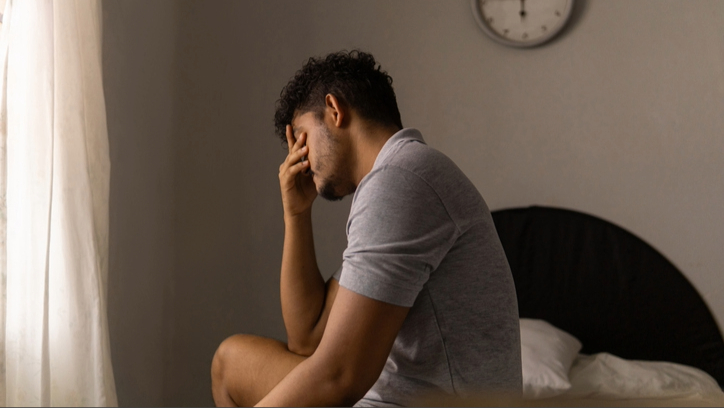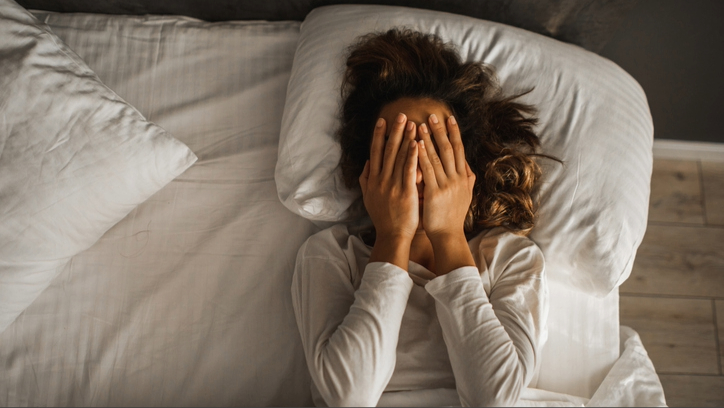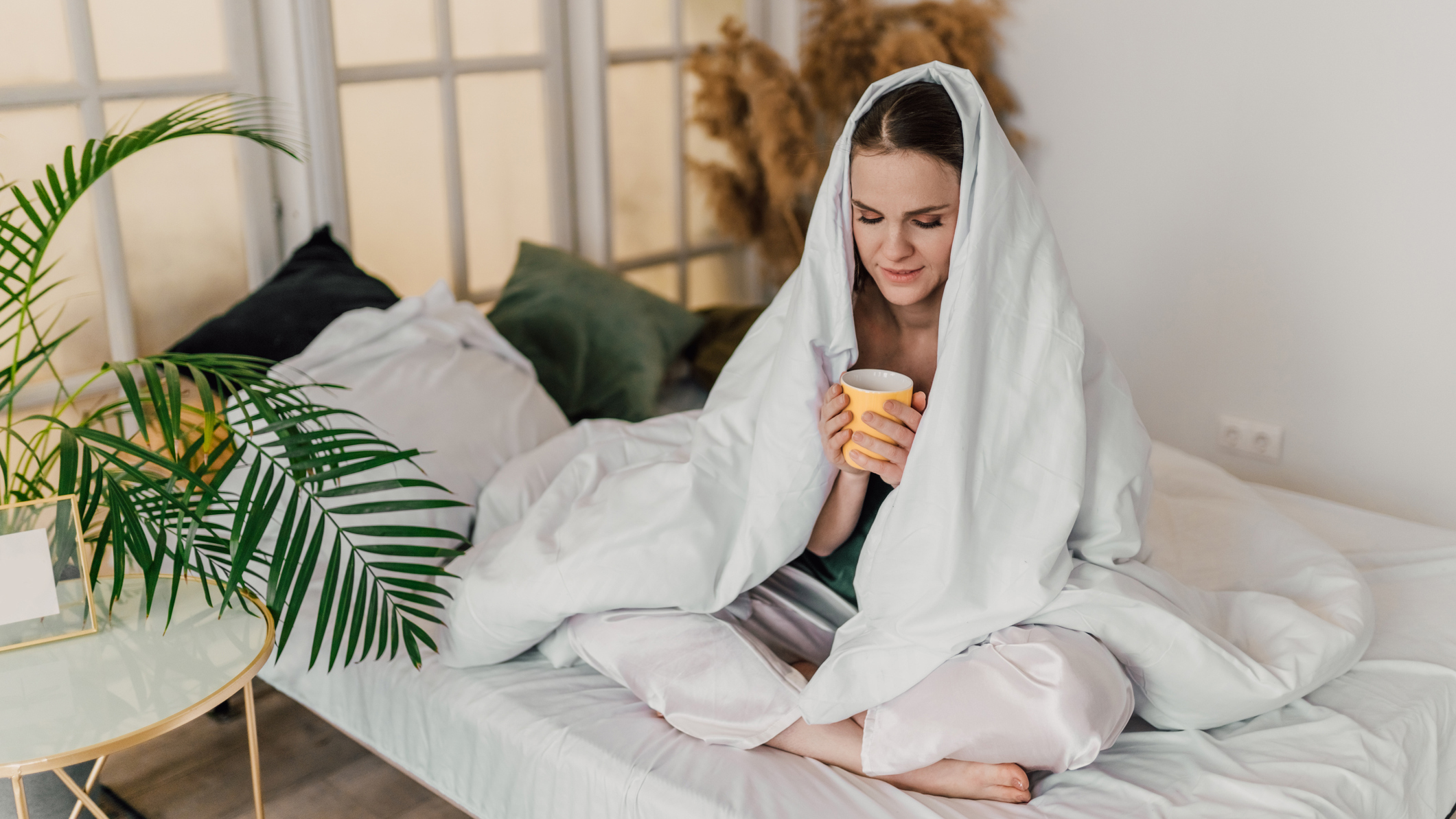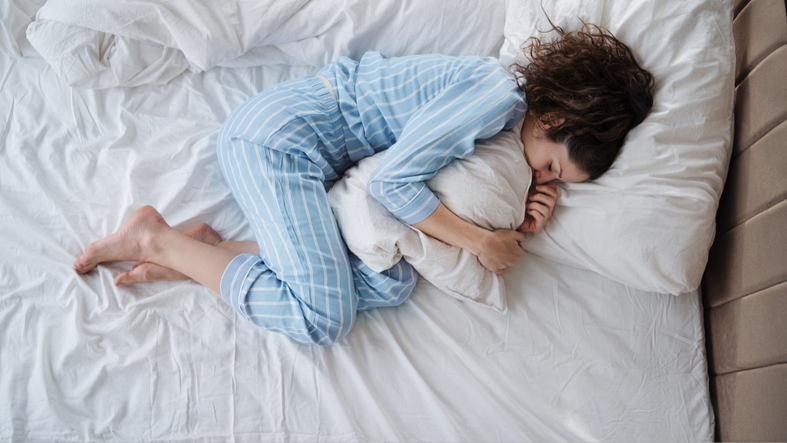
Mental health and sleep go hand in hand. Not getting enough sleep can generally lower your mood anyway, but people dealing with anxiety and depression particularly find it hard to get consistently good quality sleep.
While anxiety is often associated with insomnia and sleep deprivation, depression is associated with over sleeping, sleep inertia and, in some cases, insomnia too. This World Mental Health Day, we asked Dr Lindsay Browning, chartered psychologist and founder of sleep issue clinic Trouble Sleeping, how sleep is affected by anxiety and by depression, how they each hit sleep differently, and why.
Dr Browning also shares her top tips for getting better sleep if you have anxiety, depression or both, so you can start getting better rest.
How does anxiety affect sleep?
Anxiety is characterized by racing thoughts, persistent worries and panic attacks, along with hormone changes, which can severely interfere with your sleep.
Dr Browning explains: “If you are anxious then your body can become physiologically aroused with an increased heart rate, faster and shallow breathing, increased cortisol and adrenaline all of which make it harder to fall asleep.”
She adds: “If someone is anxious, they often find their mind busy with fretful thoughts and worries which can make it harder to relax and fall asleep.”
Anxiety and poor sleep can exacerbate each other
There is a two-way relationship between anxiety and poor sleep. While anxiety can make it harder to fall asleep, poor sleep can also increase your susceptibility to symptoms of anxiety, making it more difficult to manage emotions and handle stress during the day.
“If someone is sleeping poorly then this can lead to increased anxiety levels," says Dr Browning, "thus, anxiety and poor sleep can exacerbate each other.”
How does depression affect sleep?
Depression has an equally significant impact on sleep quality and quantity. People suffering with depression will experience different sleep problems. Some struggle to fall asleep and stay asleep during the night, while others find it extremely difficult to wake up and sleep too much.
“When someone is depressed, they often have trouble with their sleep in two ways. Depression can cause someone to sleep too much (hypersomnia) or have difficulty falling asleep, staying asleep or waking up too early in the morning (insomnia),” says Dr Browning.
She also points out how depression can cause lower energy levels, tiredness and lethargy during the day despite sleeping sufficiently overnight. Studies show other sleep problems associated with depression are increased rapid eye movement (REM) causing disturbing vivid dreams.

Although depression and anxiety are different conditions, each bringing different sleep disturbances, the two mental health challenges commonly occur together. So what happens to sleep when someone is experiencing them simultaneously?
According to Dr Browning: “Some studies have found that sleeping problems may be worse for people experiencing both anxiety and depression than for those dealing with just one.
"Anxiety often causes difficulty falling asleep due to worry and restlessness, while depression can lead to waking up too early or sleeping too much. When both conditions are present, it can result in fragmented sleep, poor sleep quality and daytime fatigue, creating a cycle where poor sleep makes both conditions worse.”
How to sleep better with anxiety
1. Establish a bedtime routine
Dr Browning’s first tip for sleeping better with anxiety is establishing “a calming bedtime routine to wind down before bed.” As sleep writers, we’ve spent a lot of time perfecting our nighttime routines to help us fall asleep faster and understand that these routines should be personalized.
Find activities you find relaxing – for some this may be listening to classical music, but others might find this music more annoying than relaxing. That said, experts generally agree nobody should be checking their phone within 30 minutes of bedtime.
2. Avoid stimulants
While sleep experts say there are types of people who should drink coffee before bed, people suffering with anxiety certainly don’t fall in these categories. Dr Browning recommends people with anxiety avoid stimulants like caffeine in the evening as they can keep you too alert to sleep, increasing nighttime anxiety.
Switching out caffeinated drinks later in the day for herbal teas will induce a more calm mind and nervous system as you prepare to sleep.

3. Breathing techniques
“Practice slow, deep breathing techniques to calm your body and mind, promoting relaxation and making it easier to fall asleep,” says Dr Browning. Deep breathing is a natural sleep aid and, best of all, it’s completely free and easy to do.
We’ve tried, tested and recommend breathing methods like the 4 7 8 sleep method and belly breathing to ease nighttime anxiety and improve sleep quality. These methods involve conscious breathing and breath counting to calm your mind as you drift off to sleep.
How to sleep better with depression
1. Set a bed and wake up time
Routine is the groundwork of quality sleep. Dr Browning recommends setting a regular sleep/wake schedule to alleviate sleep problems induced by depression.
Going to bed and waking up at the same time each day, and getting up as soon as your alarm goes off, helps your body and mind know when it is time to sleep and when it is time to be alert.
This will essentially regulate your circadian rhythm and an efficient body clock helps you to drift off easier at night and wake up refreshed, mentally and physically, in the morning.
2. Get outside as early as you can
Dr Browning says you should “get outside daily for exposure to bright sunlight or natural daylight, which can boost your mood and improve sleep.” Sunlight regulates your body’s internal clock by affecting the production of melatonin (the hormone that helps you sleep) and serotonin (the hormone that helps you feel awake) at the right times in your sleep / wake cycle.
Getting out for a daily walk or just sitting outside can do wonders for your mood and your sleep, making it a win-win.
3. Don’t waste time in bed
Your bed should be reserved for sleeping and being disciplined with this rule will help you signal to your body and mind when it is time to sleep. Therefore, staying in bed when you can’t sleep at night can cause trouble.
Dr Browning advises: “If you find yourself struggling to fall asleep or go back to sleep, get up after about 20 minutes and do something calming, like reading a book, before returning to bed when you feel sleepy.”

How good sleep improves your mental health
We know sleep is vital for our physical health, giving us time to relax our bodies, repair muscles and restore energy levels. But sleep is vital for maintaining good mental health too – our brains need just as much rest as our bodies. Getting plenty of quality sleep reduces stress, boosts memory and mood and improves our ability to think clearly, which cumulatively reduce the risk of developing poor mental health.
To get this quality sleep, you must make sure your sleep environment and routine is conducive to rest. From investing in the best mattress for your body type and sleep position to kitting your bed out with the best comforting pillows, there are plenty of things you can buy to help your sleep. Alternatively, free lifestyle changes can improve your sleep, starting from tonight.
Cleaning your bed to remove dust mites, allergens and debris from your mattress, pillows and sheets should be top of your sleep hygiene list. Additionally, regulating your circadian rhythm with help of a healthy bedtime routine and natural sunlight exposure first thing each morning (crucially before you check your phone) will help you drift off more smoothly at night, setting you up for a more positive day.







